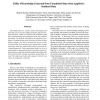227 search results - page 11 / 46 » Representing Incomplete Knowledge about Fuzzy Sets |
JUCS
2008
13 years 7 months ago
2008
: Reasoning about incomplete qualitative temporal information is an essential topic in many artificial intelligence and natural language processing applications. In the domain of n...
RULEML
2005
Springer
14 years 1 months ago
2005
Springer
Abstract. Uncertainty, like imprecision and vagueness, has gained considerable attention the last decade. To this extend we present a preliminary report on extending the Rule Marku...
PST
2008
13 years 9 months ago
2008
Knowledge discovery systems extract knowledge from data that can be used for making prediction about incomplete data items. Utility is a measure of the usefulness of the discovere...
AAAI
2008
13 years 10 months ago
2008
In this paper, we propose the use of a neuro-fuzzy strategy to develop a Web personalization framework for the dynamic suggestion of URLs retained interesting for the currently co...
DKE
2008
13 years 7 months ago
2008
Knowledge validation, as part of knowledge base verification and validation is a critical process in knowledge engineering. The ultimate goal of this process is to make the knowle...

